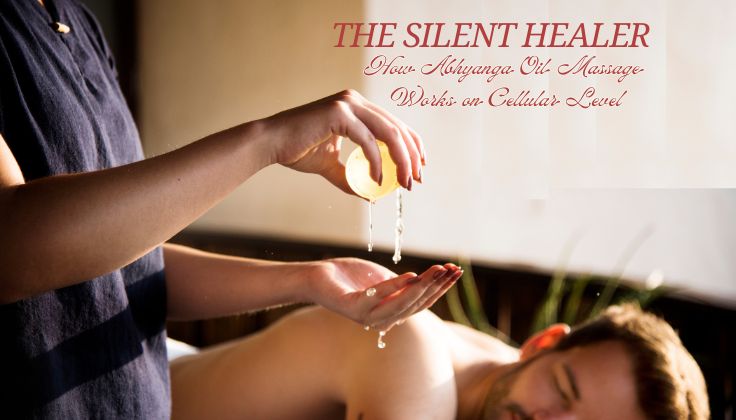


Abhyanga is simply defined as applying oil to the body.
But the full-body oil ayurvedic massage goes beyond the typical muscle relaxation. This time-honored therapy works at a cellular level, boosting circulation, detoxifying the body, and promoting overall well-being.
The effects of Abhyanga reach deep into tissues and organs, supporting health from the inside out. So, in this blog, The Silent Healer: How Abhyanga Oil Massage Works on Cellular Level, we will discuss how the massage therapy works its magic by the experts at our ayurvedic hospital Dubai.
What is Abhyanga Oil Massage?
Abhyanga is a therapeutic full-body massage that uses warm, herbal oils tailored to your unique dosha (body constitution). It is specifically designed with an aim to balance the body, mind, and soul.
Abhyanga’s effects go beyond the skin. It also works with your body on a cellular level to stimulate and restore various processes essential for maintaining good health.
Improved circulation helps with delivering oxygen and nutrients to cells, promoting a healthy and better organ function. The warm oils enhance blood flow, making certain that tissues receive the nourishment they need. The body’s ability to heal itself increases with better blood flow.
Abhyanga helps eliminate toxins (Ama) from deep within the tissues. The gentle, rhythmic strokes stimulate the lymphatic system, aiding in the natural detox process. This boosts the body’s immune system as well.
The oils used in the procedure include rich vitamins/ essential fatty acids, etc. They are known for deeply hydrating and nourishing the skin. It promotes collagen production, and the massage helps with fine lines and wrinkles.
The massage also helps in activating the parasympathetic nervous system, which encourages relaxation in the body. The deep pressure and rhythmic movement also assist the release of endorphins ( the happy hormone), which help relieve stress and anxiety. This calming effect on the nervous system promotes mental clarity and emotional stability.
The oils penetrate into the deeper layers of the skin, stimulating cell regeneration and tissue repair. It also helps with the skin, muscles, and joints. Abhyanga also encourages the overall cellular health and supports long-term vitality. It also strengthens muscles and bones, improving mobility and flexibility.
Detoxifies the body by removing toxins & impurities.
Reduces stress and anxiety, promoting relaxation and mental clarity.
Improves the skin, resulting in a healthy glow and smooth texture.
Increases joint flexibility, which relieves stiffness and discomfort.
Encourages deep sleep - offers relief for insomnia.
Strengthens the immune system to bolster the body's chance to fight off illness.
Ayurveda cites dosha as the energies that govern the body. So an imbalance in the dosha means a dip in your overall health. Abhyanga helps restore balance to each dosha by using oils that complement your body's unique needs.
Vata types are typically prone to dryness, anxiety, and other irregularities as well.
Sesame oil is the ideal choice for Vata, offering warmth and grounding effects.
This oil helps reduce stress, ease dryness, and promote joint flexibility.
They are fiery, intense, and quite prone to inflammation.
Coconut oil is recommended for cooling down the body and reducing inflammation.
Brahmi oil, known for its calming properties, helps balance excess heat and stress.
Kapha types tend to be heavy, slow and lethargic.
Mustard oil assists in stimulating circulation and detoxifying the body.
Triphala oil is helpful for someone looking for weight loss, lymphatic drainage, and digestive support.
Abhyanga can be administered both professionally and with some expert guidance at home. The general process looks like this:
It’s important to give rest to your body after an Abhyanga session.
Which Oils Are Used in Abhyanga?
Here are some popular choices:
Abhyanga is especially useful for stress relief. The slow, steady massage stimulates the nervous system, which produces endorphins that reduce stress levels. Abhyanga promotes calm by reducing anxiety and improving clarity of thought.
The best time for Abhyanga is early in the morning, just before bathing. This helps the body absorb the oils while your muscles are relaxed, making the massage more effective. If done regularly, it becomes part of a healthy morning routine.
To achieve the best results, aim to practice Abhyanga at least twice a week. For maximum benefits, incorporating it daily as part of your routine can support your body’s natural detoxification and rejuvenation.
Abhyanga can not be labelled as a luxury massage. Regular practice brings numerous benefits, from better skin to improved mental clarity. It’s one of the most effective methods to prevent illness and achieve a sense of balance in your life.
Take a look at some of the additional benefits of Abhyanga that are often overlooked:
Reduces muscle tension and stiffness.
Boosts metabolism and healthy weight loss.
Helps with digestion & promotes a healthy gut
Improves mental focus and concentration.
Abhyanga can detoxify the body, reduce stress, nourish the skin, and promote health at a cellular level. It is effective on deep levels in the body and is one of the most effective natural therapeutic techniques for metabolic balance and vitality.
Start making this Ayurvedic tradition a part of your life to enjoy a healthier, more balanced life. To know more about authentic ayurvedic treatments, including Panchakarma in Dubai, connect with our experts at Ayurheritage today!